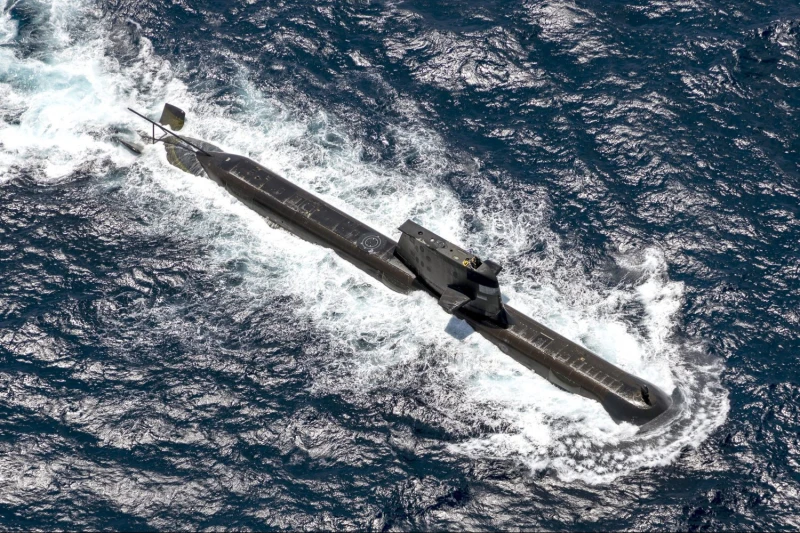Australia will purchase at least three, and possibly five, Virginia-class nuclear-powered submarines from the United States and eventually, alongside Britain, deploy a new class of nuclear-powered submarines jointly developed by the three nations.
The submarines plan is just one part of the deepening security collaboration among the three countries aimed at countering China. Next steps could include basing U.S. nuclear-capable platforms—such as strategic bombers—in Australia as well as cooperation on hypersonic missiles, cyber operations, quantum computing, and in other areas. All this likely makes AUKUS more consequential for the regional military balance than any other of the so-called mini-lateral groupings, including the Quadrilateral Security Dialogue (Quad) joining Australia, India, Japan, and the United States; or the Five Power Defense Arrangements among Australia, Britain, Malaysia, New Zealand, and Singapore. AUKUS is truly unique because of its exclusive focus on modernizing and enhancing the interoperability of the participants’ military capabilities to deter and, if necessary, defeat China in a potential future conflict.
Predictably, Beijing has railed against AUKUS. Chinese Foreign Ministry spokesperson Wang Wenbin accused the three nations of engaging in “hegemonic practice” and said the deal demonstrates a “Cold War mentality” designed to contain China. Beijing has also raised concerns about AUKUS allegedly undermining the international nuclear non-proliferation regime, with Wang warning the three partners against going down this “dangerous path.”
Aside from China’s, responses to AUKUS across the Indo-Pacific have been generally positive—or at least not negative—since the pact was announced in September 2021. Some countries, mainly in Southeast Asia, are concerned about the potential for nuclear proliferation. Overall, however, most Indo-Pacific nations either support AUKUS or avoid publicly opposing it, suggesting widespread and varied concerns about China’s military buildup, growing power, and intentions in the region. This bodes well for AUKUS’ ability to tie in additional allies and partners for the purpose of peacetime deterrence. In the case of AUKUS’ closest friends, this could even extend to military operations in a potential war.
As a stalwart U.S. ally with an increasingly strained relationship with China, Japan unsurprisingly supports AUKUS. During a call with Albanese last month, Japanese Prime Minister Fumio Kishida noted that AUKUS would “contribute to the peace and stability of the Indo-Pacific region amidst an increasingly severe security environment.” Last December, Tokyo released its new National Security Strategy, which described Beijing’s military activities as “unprecedented and the greatest strategic challenge.”
Japan’s primary concern is its dispute with China over the Senkaku Islands (which Beijing calls the Diaoyu Islands). But in recent years, Tokyo has increasingly voiced its concerns over Beijing’s military pressure against Taipei, as well. Writing in Foreign Policy, Hoover Institution scholar Michael Auslin argued that Japan belongs in AUKUS (making it JAUKUS?). Tokyo hasn’t taken an official position, but it is unlikely to engage in any use of nuclear technology for warfare. Fierce domestic political opposition rooted in the public’s memory of World War II still exists in Japan. Still, Tokyo is likely to find other parts of the AUKUS agenda, such as quantum computing, more appealing and politically feasible.
South Korea, another critical U.S. ally, hasn’t officially weighed in on AUKUS. Understandably, this is because South Korea focuses on North Korea and tries to maintain a delicate balance between China and the United States. However, South Korean President Yoon Suk-yeol is clearly uncomfortable with Chinese assertiveness in the region. In June 2022 in Madrid, he became the first South Korean leader to attend and speak at a NATO summit, where the main topic of discussion was how the alliance could counter China and Russia. Under Yoon, South Korea is reportedly seeking to increase engagement with, and potentially join, the Quad, another security grouping designed in large part to check China. Yoon’s administration is also poised to participate in the U.S.-led Chips 4 alliance, alongside Japan and Taiwan, in an effort to diversify semiconductor manufacturing away from China.
When asked as an election candidate in 2021 what he thought of AUKUS, Yoon responded that Seoul did not need the type of nuclear-powered submarines headed for Australia. That said, since the recent test of a submarine-launched ballistic missile by North Korea, Yoon may well change his mind. There are other reasons for Seoul to consider nuclear-powered submarines; indeed, South Korean officials have privately suggested they desire the national prestige and expertise associated with having them. Additionally, polling shows 71 percent of South Koreans in favor of re-stationing nuclear weapons in their country. What’s more, Yoon commented in January that South Korea might have to go nuclear to counter a nuclear-armed North Korea. Hence, Seoul might benefit from AUKUS-style arrangements in the future. That said, it is currently very unlikely Washington would accommodate it.
Meanwhile, Taiwan—frequently the target of China’s ire—has understandably embraced AUKUS. In the most recent statement on the topic, in March, Taipei’s Ministry of Foreign Affairs said it “welcome[d] the steady advancement of AUKUS,” adding “[the ministry] believes that this trilateral cooperation will strengthen deterrence capability in the Indo-Pacific and contribute to the maintenance of regional peace and stability.” Taiwan probably hopes AUKUS speeds up and deepens defense collaboration so that the island can maximize deterrence or effectively leverage the pact in a future conflict.
In Southeast Asia, AUKUS is more controversial. Despite China’s encroachments in the South China Sea and elsewhere, virtually all nations are attempting to stay out of great power competition by neither endorsing nor condemning the pact. The region’s only strong AUKUS supporter is the Philippines, another U.S. ally that also faces daily Chinese pressure in the disputed South China Sea. For the Philippine government in Manila, AUKUS is a helpful addition to regional security architecture. In 2021, Philippine Foreign Secretary Teodoro Locsin Jr. noted that AUKUS “should restore and keep balance rather than destabilize it.”
Among other Association of Southeast Asian Nations (ASEAN) states, AUKUS gets cautious support. Singapore, for example, has not released a statement since last month’s summit in San Diego. But in 2021, Singaporean Prime Minister Lee Hsien Loong and then-Australian Prime Minister Scott Morrison discussed the then-new pact, which Lee reportedly hoped would “contribute constructively to the peace and stability of the region and complement the regional architecture.”
Source: Foreign Policy










